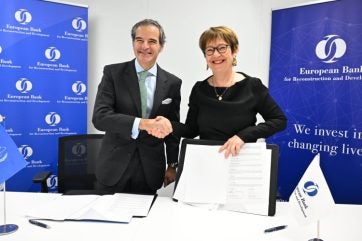
International Atomic Energy Agency (IAEA) Director General Rafael Mariano Grossi and EBRD President Odile Renaud-Basso signed a memorandum of understanding (MOU) on the sidelines of the United Nations Climate Change Conference (COP29) in Baku, Azerbaijan.
“Together we are not only building on years of successful cooperation in nuclear safety, but we are opening new doors for capacity building, clean energy and economic resilience. Partnering with financial institutions, like the EBRD, is essential to unlocking the investments needed for a low carbon future, ensuring nuclear energy’s unique benefits are accessible, safe and sustainable for all,” said Grossi.
He highlighted the importance of partnerships with financial institutions and the private sector to scale up nuclear energy. The IAEA invites government, industry, banks and other stakeholders to partner with the Agency and to contribute their financial resources, expertise, industrial knowledge and advocacy.
Under the MOU, the IAEA and the EBRD will coordinate activities to support countries to build capacity in developing energy policy, energy strategy, governance and financing frameworks, and mechanisms to reach net zero goals, taking into account the potential for countries to use nuclear energy. Activities will also promote gender equality in the nuclear sector, including through the IAEA Marie Sklodowska-Curie Fellowship Programme and the Lise Meitner Programme.
Countries will benefit from the partnership’s activities that will support nuclear and radiation safety and technical infrastructure throughout the lifecycle of electrical and non-electrical applications of nuclear energy. This will include the decommissioning of associated facilities and the management of radioactive waste and environmental releases.
This latest agreement builds upon and will support ongoing cooperation. The IAEA and the EBRD already cooperate within the Coordination Group for Uranium Legacy Sites (CGULS), on Chornobyl-related projects and peer reviews of EBRD-managed projects.
In 2021, the IAEA and the EBRD agreed to continue to work together, in cooperation with Ukrainian authorities, towards safe and cost-effective solutions to decommission the Chornobyl Nuclear Power Plant and manage radioactive waste in the Exclusion Zone.
The EBRD supports nuclear decommissioning and remediation in Eastern Europe, Russia and Central Asia. In addition to Chornobyl-related projects, the IAEA has provided technical advice for the decommissioning of nuclear power plants in Bulgaria, Lithuania and Slovakia and previously cooperated with the EBRD in environmental remediation in Central Asia through the CGULS.






